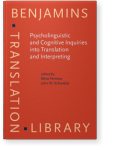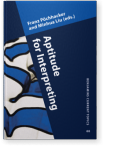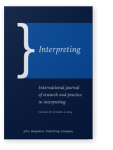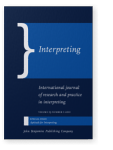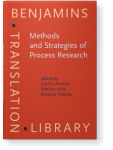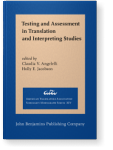Šárka Timarová
List of John Benjamins publications for which Šárka Timarová plays a role.
2015 Simultaneous interpreting and working memory capacity Psycholinguistic and Cognitive Inquiries into Translation and Interpreting, Ferreira, Aline and John W. Schwieter (eds.), pp. 101–126 | Article
The aim of the present exploratory correlational study was to test whether a relationship exists between working memory capacity (WMC) and simultaneous interpreting (SI) performance measures in a sample of professional interpreters. Twenty-eight professional interpreters, aged 25–55, were tested on… read more
2014 Learning styles, motivation and cognitive flexibility in interpreter training: Self-selection and aptitude Aptitude for Interpreting, Pöchhacker, Franz and Minhua Liu (eds.), pp. 33–54 | Article
Admission testing for conference interpreter training programmes traditionally focuses on skills directly related to the interpreting skills, and while soft skills, such as motivation, are recognised as important, they are not systematically tested or researched. The present study attempts to… read more
2014 Simultaneous interpreting and working memory executive control Interpreting 16:2, pp. 139–168 | Article
Working memory is a complex cognitive component responsible for maintenance of information during processing. Interpreting research has so far focused on working memory capacity rather than on the central executive functions. In the study described here, 28 professional interpreters completed a… read more
2011 Learning styles, motivation and cognitive flexibility in interpreter training: Self-selection and aptitude Aptitude for Interpreting, Shlesinger, Miriam † and Franz Pöchhacker (eds.), pp. 31–52 | Article
Admission testing for conference interpreter training programmes traditionally focuses on skills directly related to the interpreting skills, and while soft skills, such as motivation, are recognised as important, they are not systematically tested or researched. The present study attempts to… read more
2011 Time lag in translation and interpreting: A methodological exploration Methods and Strategies of Process Research: Integrative approaches in Translation Studies, Alvstad, Cecilia, Adelina Hild and Elisabet Tiselius (eds.), pp. 121–146 | Article
Time lag between the source text input and the interpreter’s target text is known as ear-voice span or décalage. Recently, time lag has also been measured in written translation based on eye-tracking and key-logging (hence called eye-key span). Time lag provides insight into the temporal… read more
2009 The predictive validity of admission tests for interpreting courses in Europe: A case study Testing and Assessment in Translation and Interpreting Studies: A call for dialogue between research and practice, Angelelli, Claudia V. and Holly E. Jacobson (eds.), pp. 225–245 | Article
